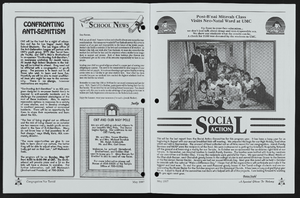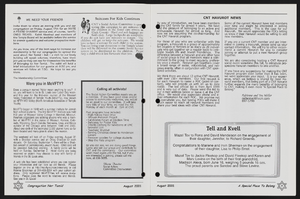Search the Special Collections and Archives Portal
Search Results

Meeting minutes for Consolidated Student Senate, University of Nevada, Las Vegas, November 7, 1978
Date
Archival Collection
Description
Text
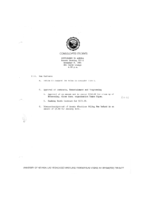
Meeting minutes for Consolidated Student Senate University of Nevada, Las Vegas, November 8, 1984
Date
Archival Collection
Description
Text
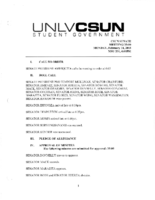
Meeting minutes for Consolidated Student Senate, University of Nevada, Las Vegas, February 14, 2005
Date
Archival Collection
Description
Text
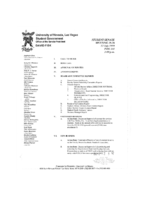
Meeting minutes for Consolidated Student Senate University of Nevada, Las Vegas, July 12, 1999
Date
Archival Collection
Description
Text
Regional subject files, 1859, 1908, 1970-2015
Level of Description
Scope and Contents
The regional subject files include materials collected by anthropologist Katherine Spilde about Native American gaming, Native American communities in the United States, and the US and international gaming industries. The materials date from 1859 to 2015, with the bulk of materials dating from 1990 to 2010. Materials dating from the nineteenth and early twentieth centuries are a reproduction of a federal treaty and an ethnohistorical essay. The majority of the materials document Native American gaming following the passage of the 1988 Indian Gaming Regulatory Act. The papers include research and subject files created by Dr. Spilde during her employment with the National Gambling Impact Study Commission (NGISC), National Indian Gaming Association (NIGA), and Harvard Project on American Indian Economic Development (HPAIED). The materials document Native American gaming enterprises both on and off reservations, the socioeconomic impact of gaming, the political history of gaming in the US, and international gaming. The series includes socioeconomic reports, testimonies, correspondence, memos, press releases, photographs, audiovisual materials, promotional materials, brochures, fact sheets, summaries, booklets, pamphlets, advertisements, tourism materials, journal articles, legal briefs, legislative documents, court opinions, notes, presentations, conference materials, periodicals, community newspapers, and newspaper articles.
The collection contains documentation on a number of Native American nations, including the Misi-zaaga'iganiing Anishinaabeg (Minnesota Chippewa Tribe, Mille Lacs Band); Gaa-waabaabiganikaag Anishinaabeg (Minnesota Chippewa Tribe, White Earth Band); Forest County Bodéwadmi (Forest County Potawatomi Community); Ho-Chunk Nation of Wisconsin; Mashantucket Pequot Indian Tribe; Mohegan Tribe of Indians; Tulalip Tribes of Washington; Sisseton-Wahpeton Oyate of the Lake Traverse Reservation; Standing Rock Sioux Tribe of North and South Dakota; Mandan, Hidatsa, and Sahnish (Arikara) (Three Affiliated Tribes of the Fort Berthold Reservation, North Dakota); and Mississippi Band of Choctaw Indians. Other communities are also represented in the series, but to a lesser extent. In addition to materials about gaming and casinos, Dr. Spilde also collected documents, photographs, and audiovisual materials about Native American culture in general. The series documents regional and national trends in Native American gaming, and the greater gaming industry. Materials trace federal and state relationships with individual Native American nations, specifically concerning gaming enterprises.
Archival Collection
Collection Name: Katherine A. Spilde Papers on Native American Gaming
Box/Folder: N/A
Archival Component
Kane Springs Ranch Records
Identifier
Abstract
The Kane Springs Ranch Records (1930-2005) contain materials related to the Kane Springs Ranch in Meadow Valley Wash outside of Moapa, Nevada. The collection primarily focuses on the property itself, but also contains a genealogy of the Huntsman family, the ranch's first owners. Records include deeds and materials from the sale of the Kane Springs Ranch to the Bureau of Land Management in 2005. The bulk of the collection documents how the Bradley Stuart family used its resources from 1952 to 2003. These materials are related to water usage on the property and a rock and sand mining operation.
Archival Collection
Roger D. Foley Papers on United States v. Cappaert
Identifier
Abstract
The Roger D. Foley Papers on United States v. Cappaert are comprised of materials collected by District Judge Roger D. Foley while performing his duties as judge in
Archival Collection

